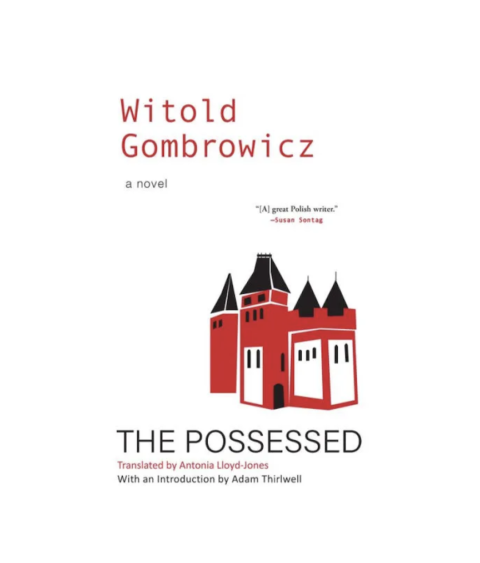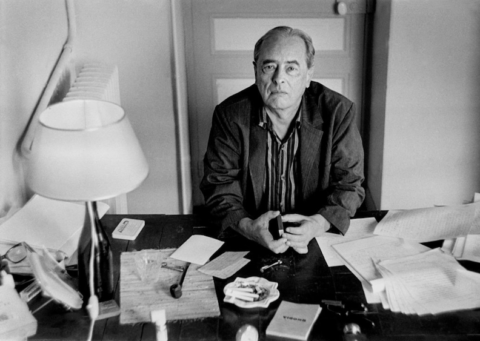I am not sure Witold Gombrowicz, despite his documented narcissism and drive to impose his views on the world, would have been happy to see The Possessed translated into English. After all, he did not own up to being the author of this potboiler until 1969, that is, long after the world had forgotten about first reading it when serialized in Polish magazines in the months leading up to World War II. By the time the Nazis invaded Poland, he was in Buenos Aires, having sailed there as a guest of honor on Poland’s newest ocean liner. By choosing to remain in Argentina instead of returning to Europe, he hoped to deal Form – a myriad of cultural and societal norms and mechanisms that shape, or, as he’d have it, enslave us – a decisive blow. The price Gombrowicz paid for rejecting Polishness and everything he hated about it? Over two decades of penury in the Pampas.
 But with time he did become famous — a vote or two away from winning the Nobel Prize for literature — and while most of his novels were initially re-translated into English from French, the completists among us will no doubt celebrate this release. What’s not to like in a novel that features, as Adam Thirlwell points out in his introduction, “a mad prince in a remote and ruined castle, and a haunted room, and a possible treasure.” That is more than the usual trifecta found in gothic novels and crime stories.
But with time he did become famous — a vote or two away from winning the Nobel Prize for literature — and while most of his novels were initially re-translated into English from French, the completists among us will no doubt celebrate this release. What’s not to like in a novel that features, as Adam Thirlwell points out in his introduction, “a mad prince in a remote and ruined castle, and a haunted room, and a possible treasure.” That is more than the usual trifecta found in gothic novels and crime stories.
Furthermore, while the novel has long been thought of as a ‘well-written bad book,’ it is a kaleidoscope of Gombrowicz’s subjects, themes and intrigues, chief among them illicit desire, class dynamics, and the wish to get to know oneself while fleeing with disgust in the opposite direction. The sparring with Form is with us from the get-go, as seen, for example, in the way that a councilor named Szymczyk, who has just been blown off by a younger man after pointing out that leaning out the window of a moving train is prohibited, tries to figure the impertinent fellow out:
“Who might this be? thought the councillor [sic]. He’s got two rackets, so perhaps he’s the son of a resident of these parts? But his hands are rough, with poorly kept nails, as from physical work. Anyway, his hair is not well groomed and his voice is rather common. A proletarian, then? No, a proletarian wouldn’t have ears and eyes like his. But then the mouth and chin are almost working class … and altogether there’s something suspicious about him … a sort of hybrid.”
The name of this 20-year old dark blond is Marian Leszczuk (Walczak until the end of Ch. 2), and he has been hired to train the local tennis star, Maja Ochołowska. Fortuitously, she is traveling on the same train as is her fiancé, Mr. Cholawicki, secretary to Prince Holszański, who — you guessed it — is also on the train. What happens next, and next after that, is anyone’s guess, but the stage has been set with most of the main characters present. Like Marian Leszczuk, they are all in transit, neither here nor there, though they cling to their backgrounds, appearances (real and imagined), and the roles that they’ve come to play and be defined — possessed? — by.
Time and again, the intrigue’s push and pull is, appropriately so, preceded by a setting that goes above and beyond the elements of exposition. “As darkness fell,” begins one example, “the veil of approaching night started to cover the boughs of the trees. A great moon was rising over the meadows. Dogs were barking in a distance village.” Or: “Clouds of mist floated above the floodplain, over the reed-choked marshes and the clumps of bushes. There was no end to this confusion of the elements of earth, water and mist, in which one’s vision drowned and lost its way, unable to find a resting place.” These shadowy worlds reflect the characters’ mindsets and the shenanigans they engage in. The castle, with its coveted art collection, described as “a dying creature, doomed to extinction, sent mad by its own greatness, collapsing under the burden of the centuries,” isn’t just a prop but a punching bag for Gombrowicz’s struggle with Poland, that proverbial thorn poking out of his side wherever he goes.
 The mad prince, as befitting his standing and pedigree, is himself full of secrets, including being haunted by the memory of his dead or abandoned son, Franio. Whether Franio is a real person or just a figment of the prince’s imagination is up to the readers to decide. The prince’s secretary, Mr. Cholowicki, who has got his eyes on stealing the art collection and marrying Maja, the tennis player, is equally puzzled by the prince’s visits to the dungeons,where, calling out the son’s name and putting his head against the wall, the prince seems to engage in writing. But this isn’t beautiful calligraphy — rather, “individual letters, scattered in various places without connection, sometimes forming figures, sometimes drawn upside down.” In other words, it’s a riddle, though — wait for it — one composed of kisses the prince leaves on the wall after “painting his lips with the indelible pencil.” As Cholowicki sees it …
The mad prince, as befitting his standing and pedigree, is himself full of secrets, including being haunted by the memory of his dead or abandoned son, Franio. Whether Franio is a real person or just a figment of the prince’s imagination is up to the readers to decide. The prince’s secretary, Mr. Cholowicki, who has got his eyes on stealing the art collection and marrying Maja, the tennis player, is equally puzzled by the prince’s visits to the dungeons,where, calling out the son’s name and putting his head against the wall, the prince seems to engage in writing. But this isn’t beautiful calligraphy — rather, “individual letters, scattered in various places without connection, sometimes forming figures, sometimes drawn upside down.” In other words, it’s a riddle, though — wait for it — one composed of kisses the prince leaves on the wall after “painting his lips with the indelible pencil.” As Cholowicki sees it …
“Without a doubt he had discovered the madman’s secret shrine, his hidden ‘temple of reverie,’ the place that for some strange reason the prince had chosen as a site for the brooding, sighs and confidences. The recluse with an unhealed wound in his soul confided in a wall—for lack of a better friend.”
Meanwhile, Maja falls for Leszczuk, her coach who, we eventually learn, is with a girl named Julia. Seeing the two at a dance hall, Maja bursts with envy: “Ah, just a glimpse of him was enough for everything to become violent and passionate, terrible and unpredictable, wild and bad! If only she could be in his arms, like that girl!” Whether or not the two become an item is of secondary importance to considering how much Gombrowicz must have enjoyed himself while spinning this yarn. In terms of props, besides the castle, there are many others, including a chewed-up pencil or a levitating towel, neither of which I am going to attempt to explicate here. Reading The Possessed may indeed be trying in a variety of ways, but readers may console themselves with the thought of dipping in and out of the Diary, Gombrowicz’s masterpiece, when the going gets tough.
Witold Gombrowicz (1904-1969) is rightly considered one of Poland’s best Modernist writers, along with Bruno Schulz (1892-1942) and Stanisław Ignacy Witkiewicz, aka Witkacy (1885-1939), though his work is nowhere as dense as the former’s or experimental as the latter’s. However, the marriage of ideas and fluff is what makes Gombrowicz a hero to countless avant-garde aficionados. In turn gaudy and threadbare, just as the world is “full of obscurity and mystery, darkness and confusion, wonders and errors,” the style of The Possessed — rendered excellently by the UK-based Antonia Lloyd-Jones — suggests that Gombrowicz’s method is as much about talking things up as taking them apart, and seeing that kind of purpose being matched with irrelevance is nothing short of priceless.
[Published by Grove Atlantic on March 19, 2024, 416 pages, $17.00 US paperback]